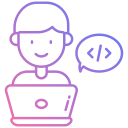Getting Experience Before Your First Job
Pick beginner-friendly repositories, tackle documentation issues, and submit small pull requests. This builds collaboration skills, code hygiene, and a visible record of contributions. Include links in your portfolio and invite feedback from maintainers to grow faster and more confidently.
Getting Experience Before Your First Job
Offer to modernize a local nonprofit’s website, organize their files in the cloud, or build a small analytics dashboard. Short shadowing experiences with IT teams can reveal workflows. Capture outcomes and lessons learned; they become powerful stories during interviews.









